中考英语简单句的五种基本类型专项解析和考点精练
「中考英语」“简单句”六大考点,专项讲解及练习(配答案)

「中考英语」“简单句”六大考点,专项讲解及练习(配答案)简单句是由一个主语(或并列主语)和一个谓语(或并列谓语)构成的句子。
对简单句的基本句型结构的考查是中考常见考点。
考点一:主语+系动词+表语。
如:Mr. Green is from Southern England.温馨提示:初中阶段所学的系动词有be, seem, keep, stay, look, smell, taste, sound, feel, become, get, turn, fall等。
考点二:主语+不及物动词。
如:She spoke at the meeting yesterday evening.考点三:主语+及物动词+宾语。
如:Tom plays many different ball games.考点四:主语+及物动词+间接宾语+直接宾语。
如:Linda sent me a lovely birthday card yesterday.温馨提示:初中阶段所学的接双宾语的及物动词有give, lend, pass, tell, show, offer, make, buy, cook, send等。
考点五:主语+及物动词+宾语+宾语补足语。
如:I will paint my room blue.考点六:there be句型。
如:There are many beautiful flowers in the garden.【考例链接】Ⅰ. 将所给单词连成句子。
要求符合语法,语句通顺,大小写正确,单词不得重复使用,标点已给出。
1. night, did, last, rain, it__________________________________________?(2014 河北)2. gift, him, birthday, gave, a, I__________________________________________.(2014 河北)3. tennis, a, Nancy, twice, week, play__________________________________________.(2014 河北)Ⅱ. 将下列汉语翻译成英语。
中考英语五大句型及句子种类专项讲解及练习(附答案)

简单句考试要求:简单句的五种基本句型及There be句型是英语学习的基础和重点,也是中考试卷的重点,在书面表达、句子改写和翻译句子中都经常考查有关句子的知识;感叹句、疑问句、祈使句更是单项选择和句型转换的重点。
1.简单句的句型简单句就是句子只有一个主语和谓语,有五种基本句型:(1)主语+谓语:这种句型称为主谓结构(S+V),其谓语一般是不及物动词。
例如:The rain stopped. 雨停了。
Things have changed now. 现在事情发生了变化。
(2)主语+连系动词+表语:这种句型称为主系表结构(S+L+P),连系动词在形式上也是一种谓语动词,表语一般是名词或者形容词。
例如:His father is a teacher. 他的爸爸是老师。
(表语是名词)Your mother is very young. 你的妈妈很年轻。
(表语是形容词)(3)主语+谓语+宾语:这种句型称为主谓宾结构(S+V+O),其谓语动词是及物动词,宾语一般是直接宾语。
例如:They often speak English at the meeting. 他们在会上经常说英语。
The house caught fire. 房子着火了。
(4)主语+谓语+间接宾语+直接宾语:这种句型称为主谓宾宾结构(S+V+O+O),其谓语动词必须是可以跟双宾语的动词,两个宾语中表示事物的是直接宾语,另一个表示人的是间接宾语。
例如:My father gave me a pen last night. 昨天晚上我爸爸给我一支钢笔。
I will write you a letter when I get there. 我到那里儿时给你写信。
(5) 主语+谓语+宾语+宾语补足语:这种句型称为主谓宾及宾补结构(S+V+O+C)其谓语动词必须是可以跟复合宾语的及物动词。
例如:I find him very clever. 我发现他很聪明。
简单句的基本句型讲解(附练习题+答案)

简单句的基本句型讲解(附练习题+答案)简单句:由一个主语(或并列主语)和一个谓语(或并列谓语)所构成的句子。
简单句分为5种基本句型:1.主语+谓语(主语+不及物动词)例1:My little sister can swim very well. 我妹妹游泳游得很好。
主语谓语(不及物动词)例2:The planehas already arrived. 飞机已经抵达。
主语谓语2.主语+谓语+宾语(主语+及物动词+宾语)例3:The poor passengers on the real Titanic saw the tip of the iceberg.主语谓语宾语泰坦尼克号上可怜的乘客们看到了冰山的顶部。
例4:The company makes films . 这家公司制作电影。
主语. 谓语宾语例5:Stanley bought a flat last year. Stanley去年买了套公寓。
主语谓语宾语3.主语+系动词+表语(主语+连系动词+表语)例6:My mother is a scientist. 我母亲是个科学家。
主语谓语表语例7:She looks young. 她看上去很年轻。
主语谓语表语例8:The cake tastes very yummy. 这蛋糕尝起来很美味。
主语谓语表语4.主语+谓语+双宾语(主语+及物动词+间接宾语+直接宾语)例9:My mother bought me a dictionary yesterday. 我母亲昨天给我买了本字典。
主语谓语间接宾语直接宾语例10:Can you give me the math book? 你能给我那本数学书吗?谓语主语谓语间接宾语直接宾语例11:Will you tell us something about your school life?谓语主语谓语间接宾语直接宾语你给我讲讲你们的学习生活,好吗?5.主语+谓语+复合宾语(主语+及物动词+宾语+补语)例12:We must keep our classroom clean and tidy. 我们必须保持教室干净、整洁。
语法专题十二 简单句【考点精讲精练】-2023年中考语法一点通(学生版)(1)

语法专题十二、简单句考点精讲英语句子以谓语动词为中心,前面是动作的执行者主语(被动语态除外)后面是动作的承受者。
简单句指的是只含有一个谓语的句子;含有两个及以上谓语的就是复合句(后面专题待续)。
1.英语的句子成分组成句子的各个部分叫句子成分。
英语的基本成分包括主语、谓语、宾语、表语、定语、状语、补语等。
主语(S ubject)是句子的主题,是说明的对象。
一般为名词(短语)、代词、数词、动名词(短语)、不定式(短语)或从句;置于句首。
谓语(V erb动词),用于说明或描述主语的行为动作或状态。
由动词或动词短语充当;在句子中位于主语之后。
宾语(O bject)表示动作支配的对象,有单宾语、双宾语之分;双宾语又分为直接宾语和间接宾语。
宾语可以由名词(短语)、代词、数词、不定式(短语)、动名词(短语)、从句等充当;一般位于及物动词(短语)和介词后面。
表语(P redicative)说明主语的身份、特征或状态。
可以由名词、代词、形容词、数词、副词、介词短语、不定式(短语)、动名词(短语)等充当;在句中位于系动词之后。
定语(attribute)是用于修饰名词或代词的词、短语或从句,可分为前置定语和后置定语。
一般由形容词、名词、形容词性物主代词、数词、分词、介词短语、不定式(短语)、从句等充当。
状语(adverbial)用于修饰动词、形容词、副词或整个句子,说明动作或状态特征。
可以表示时间、地点、原因、目的、结果、方式、伴随、条件、让步等;其位置非常灵活。
补语(C omplement)用于补充说明主语或宾语的,最常用的是宾语补足语。
宾语补足语可由名词(短语)、形容词、副词、动词不定式(短语)、介词(短语)等充当。
2.英语简单句的六种基本句型①主语+系动词+表语S十V十P主系表结构➢English is very easy. 英语很容易。
(be动词)➢It smells delicious. 它闻起来好香。
(感官动词,smell, taste, look, sound, feel)➢The food has gone bad.食物已经变质了。
(完整版)英语五大基本句型详解及相关练习(配答案)
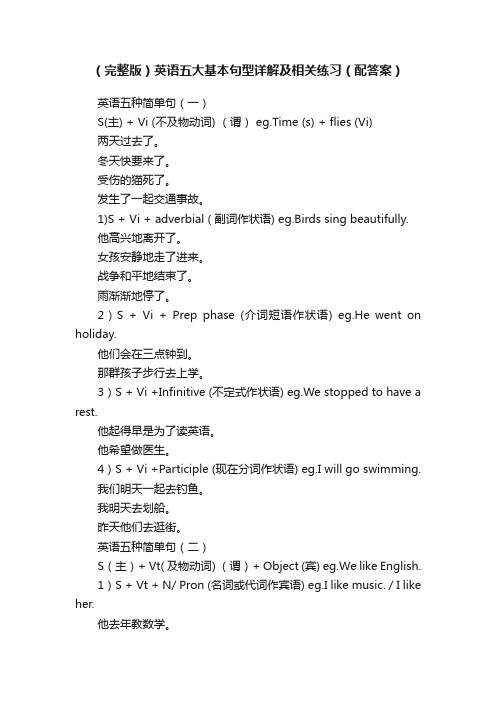
(完整版)英语五大基本句型详解及相关练习(配答案)英语五种简单句(一)S(主) + Vi (不及物动词) (谓) eg.Time (s) + flies (Vi)两天过去了。
冬天快要来了。
受伤的猫死了。
发生了一起交通事故。
1)S + Vi + adverbial ( 副词作状语) eg.Birds sing beautifully.他高兴地离开了。
女孩安静地走了进来。
战争和平地结束了。
雨渐渐地停了。
2)S + Vi + Prep phase (介词短语作状语) eg.He went on holiday.他们会在三点钟到。
那群孩子步行去上学。
3)S + Vi +Infinitive (不定式作状语) eg.We stopped to have a rest.他起得早是为了读英语。
他希望做医生。
4)S + Vi +Participle (现在分词作状语) eg.I will go swimming.我们明天一起去钓鱼。
我明天去划船。
昨天他们去逛街。
英语五种简单句(二)S(主)+ Vt( 及物动词) (谓)+ Object (宾) eg.We like English.1)S + Vt + N/ Pron (名词或代词作宾语) eg.I like music. / I like her.他去年教数学。
我们已收到了他们的来信。
2)S + Vt + Infinitive (不定式作宾语) eg. I want to help him.他爸爸期待拥有一家工厂。
他们假装在看书。
我尝试去解决那个问题。
常用于这个句型的动词有:attempt ,dare ,decide, desire, expect, hope, wish, intend, learn, need, offer, pretend, promise, propose, refuse, want, manage, plan, fail, try, agree等。
中考英语简单句的五种基本句型讲解及练习题

中考英语简单句的五种基本句型讲解及练习题简单句的五种基本句型讲解及练习题一、句子成份英语句子成分有主语,谓语,宾语,宾语补足语,表语,定语,状语等。
顺序一般是主语,谓语,宾语,宾语补足语,而表语,定语,状语的位置要根据情况而定。
1、主语:表示句子主要说明的人或事物,一般位于句首。
但在therebe结构、疑问句(当主语不疑问词时)和倒装句中,主语位于谓语、助动词或情态动词后面。
主语可由名词、代词、数词、不定式、动名词、名词化的形容词和主语从句等表示。
例如:Country musichas become more and more popular.(名词)Weoften speak English in class.(代词)One-thirdof the students in this class are girls.(数词)To swimin the river is a great pleasure.(不定式)Smokingdoes harm to the health.(动名词)The richshould help the poor.(名词化的形容词)When we are going to have an English testhas not been decided.(主语从句)Itis necessaryto master a foreign language.(it作形式主语,真正的主语为后面的不定式)2、谓语:谓语说明主语的动作,状态或特征。
可以有不同的时态,语态和语气。
1)简单谓语:Westudyfor the people.2)复合谓语:Ican speaka littleEnglish. Weare readingbooks. Hehas goneto Beijing..3、表语:它位于系动词(比方be)以后,申明主语身份,特性,属性或状况。
My sister isa nurse.Is ityours?(代词)The weather has turnedcold.(形容词)The speech isexciting.(分词)Three times seven istwenty one?(数词)His job isto teach English.(不定式)His hobby(快乐喜爱)isplaying football.(动名词)The rulermust bein your box.(介词短语)Time isup. The class isover.(副词)The truth isthat he has never been abroad.(表语从句)4、宾语:宾语表示动作行为的对象,跟在及物动词之后,We likeEnglish.How many dictionaries do you have? I havefive.(数词)They helpedthe oldwith their housework yesterday.(名词化描述词)It beganto rain.(不定式短语)I enjoylistening to popular music.(动名词短语)I think(that)he is fit for his office.(宾语从句)有些及物动词能够带两个宾语,每每一个指人,一个指物,指人的叫间接宾语,指物的叫间接宾语。
九年级英语_专题13 简单句考点聚焦和精讲(解析版)
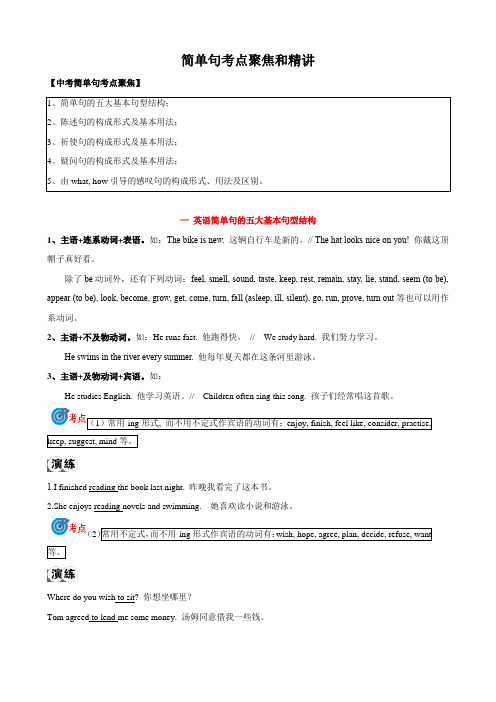
简单句考点聚焦和精讲【中考简单句考点聚焦】一英语简单句的五大基本句型结构1、主语+连系动词+表语。
如:The bike is new. 这辆自行车是新的。
// The hat looks nice on you! 你戴这顶帽子真好看。
除了be动词外,还有下列动词:feel, smell, sound, taste, keep, rest, remain, stay, lie, stand, seem (to be), appear (to be), look, become, grow, get, come, turn, fall (asleep, ill, silent), go, run, prove, turn out等也可以用作系动词。
2、主语+不及物动词。
如:He runs fast. 他跑得快。
// We study hard. 我们努力学习。
He swims in the river every summer. 他每年夏天都在这条河里游泳。
3、主语+及物动词+宾语。
如:He studies English. 他学习英语。
// Children often sing this song. 孩子们经常唱这首歌。
(1)常用-ing形式, 而不用不定式作宾语的动词有:enjoy, finish, feel like, consider, practise, keep, suggest, mind等。
1.I finished reading the book last night. 昨晚我看完了这本书。
2.She enjoys reading novels and swimming. 她喜欢读小说和游泳。
(2)常用不定式,而不用-ing形式作宾语的动词有:wish, hope, agree, plan, decide, refuse, want等。
Where do you wish to sit? 你想坐哪里?Tom agreed to lend me some money. 汤姆同意借我一些钱。
初中英语语法基础 句子结构和类型专题讲解 (附同步练习题无答案)

初中英语语法基础句子结构与类型专题讲解一.句子的种类(一)根据结构划分:①简单句:(5种基本句型)S+Vi(主+谓)S+V系动词+ P (主+系+表)S+Vt+O(主+谓+宾)S+Vt+IO+DO(主+谓+间宾+直宾)S+Vt+O+OC(主+谓+宾+宾补)②并列句and, but, or, soThis is me and these are my friends.They must stay in water, or they will die.It’s not cheap, but it is very good.It was late, so I went to bed.③复合句:包含一个主句和一个或几个从句的句子叫复合句,从句由引导词或连词引导。
名词性从句(宾语,主语,表语,同位语)从句形容词性从句(定语从句)副词性从句(状语从句)(二)根据功能划分:陈述句, 祈使句, 感叹句,疑问句(一般疑问句,特殊疑问句,选择疑问句,反意疑问句等)1)陈述句:说明一个事实或陈述一种看法。
例如:Light travels faster than sound.光比声传播速度快。
(说明事实)The film is rather boring.这部电影很乏味。
(说明看法)2)疑问句:提出问题。
有以下四种:a. 一般疑问句:Can you finish the work in time?b. 特殊疑问句:Where do you live?c. 选择疑问句:Do you want tea or coffee?d. 反意疑问句:He doesn't know her, does he?3)祈使句:提出请求,建议或发出命令。
Don't be nervous!Let’s go fishing tomorrow.4)感叹句:表示说话人惊奇、喜悦、愤怒等情绪。
What good news it is ! How beautiful the girl is !二.简单句的基本句型介绍:1. 基本句型一:S+Vi (主+不及物动词)主语:可以作主语的成分有名词,主格代词,动词不定式,动名词等等。
简单句的五种基本句型讲解及练习题
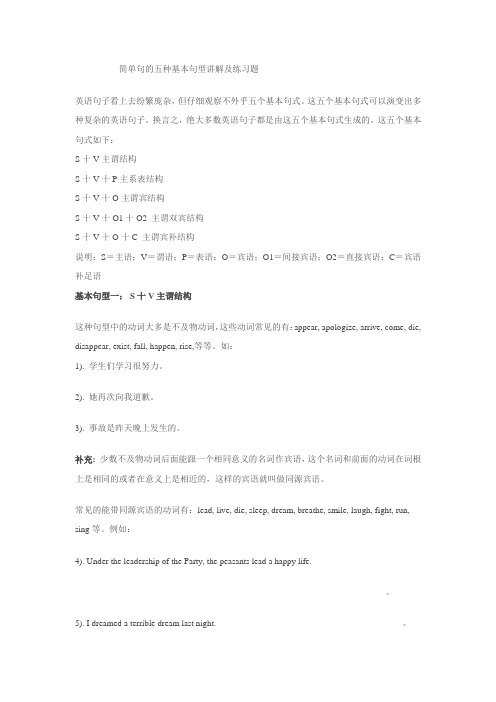
简单句的五种基本句型讲解及练习题英语句子看上去纷繁庞杂,但仔细观察不外乎五个基本句式。
这五个基本句式可以演变出多种复杂的英语句子。
换言之,绝大多数英语句子都是由这五个基本句式生成的。
这五个基本句式如下:S十V主谓结构S十V十P主系表结构S十V十O主谓宾结构S十V十O1十O2 主谓双宾结构S十V十O十C 主谓宾补结构说明:S=主语;V=谓语;P=表语;O=宾语;O1=间接宾语;O2=直接宾语;C=宾语补足语基本句型一: S十V主谓结构这种句型中的动词大多是不及物动词,这些动词常见的有:appear, apologize, arrive, come, die, disappear, exist, fall, happen, rise,等等。
如:1). 学生们学习很努力。
_____________________________________2). 她再次向我道歉。
_______________________________________3). 事故是昨天晚上发生的。
_____________________________________补充:少数不及物动词后面能跟一个相同意义的名词作宾语,这个名词和前面的动词在词根上是相同的或者在意义上是相近的,这样的宾语就叫做同源宾语。
常见的能带同源宾语的动词有:lead, live, die, sleep, dream, breathe, smile, laugh, fight, run, sing等。
例如:4). Under the leadership of the Party, the peasants lead a happy life._______________________________________________________________________。
5). I dreamed a terrible dream last night. __________________________________________。
最新中考英语专项复习之简单句
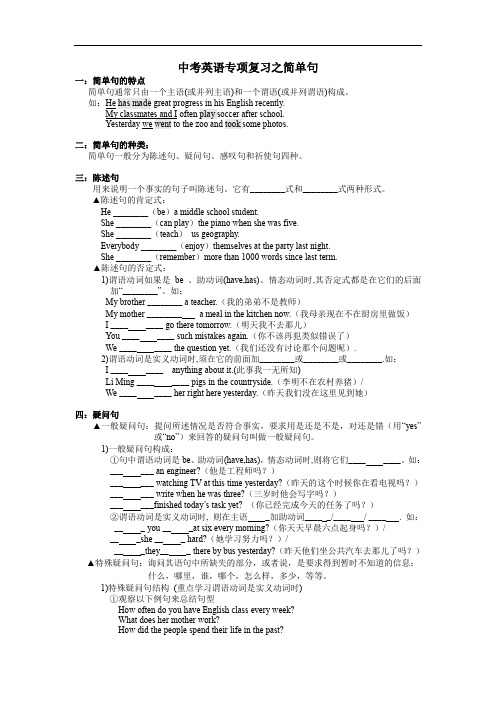
中考英语专项复习之简单句一:简单句的特点简单句通常只由一个主语(或并列主语)和一个谓语(或并列谓语)构成。
如:He has made great progress in his English recently.My classmates and I often play soccer after school.Yesterday we went to the zoo and took some photos.二:简单句的种类:简单句一般分为陈述句、疑问句、感叹句和祈使句四种。
三:陈述句用来说明一个事实的句子叫陈述句。
它有________式和________式两种形式。
▲陈述句的肯定式:He ________(be)a middle school student.She ________(can play)the piano when she was five.She ________(teach)us geography.Everybody ________(enjoy)themselves at the party last night.She ________(remember)more than 1000 words since last term.▲陈述句的否定式:1)谓语动词如果是be 、助动词(have,has)、情态动词时,其否定式都是在它们的后面加“________”。
如:My brother ________ a teacher.(我的弟弟不是教师)My mother ________ a meal in the kitchen now.(我母亲现在不在厨房里做饭)I ____ ____ go there tomorrow.(明天我不去那儿)You ____ ____ such mistakes again.(你不该再犯类似错误了)We ____ ____ the question yet.(我们还没有讨论那个问题呢).2)谓语动词是实义动词时,须在它的前面加________或________或________.如:I ____ ____anything about it.(此事我一无所知)Li Ming ____ ____ pigs in the countryside.(李明不在农村养猪)/We ____ ____ her right here yesterday.(昨天我们没在这里见到她)四:疑问句▲一般疑问句:提问所述情况是否符合事实,要求用是还是不是,对还是错(用“yes”或“no”)来回答的疑问句叫做一般疑问句。
简单句的五种基本类型和练习

简单句的五种基本类型和练习XXX撰稿老师:XXX编审老师:XXX责任编辑:XXX简单句的五种基本类型讲解和练一、定义简单句:如果句中只有一个主谓结构,而且各个成分都只由单词或短语表示,称为简单句。
如:XXX to work at 8:00 every day.我的爸爸每天八点钟去上班。
You can go XXX.你们可以明天去游泳。
They went to Beijing last week.他们上个星期去北京了。
XXX.我和妈妈都爱吃鱼。
句子是由主语、谓语动词、表语、宾语、宾语补足语、宾语和状语等组成的,依照其组合方式,简单句为五种基本句型。
二、具体用法(一)主语+不及物动词。
如:XXX.XXX.I often get up at six.(二)主语+及物动词+宾语。
如:I often play football after class.1I like XXX.(三)主语+及物动词+间接宾语+直接宾语主语:动作的执行者;谓语:申明主语做甚么;间接宾语:申明举措是对谁做的或为谁做的;间接宾语:举措的蒙受者或行动的成效;1. XXX.2. She passed him the cheese(四)主语+系动词+表语系动词:由be动词来充任,也由一些实义动词来做系动词;表语:申明主语是甚么或怎样,用名词、描述词或相称于名词、描述词的词或短语来充任,和系动词一同构成谓语。
表语也能够由数词、动名词不定式短语、名词来充任。
1. Liu Xiang is twenty-one2. XXX is clever(五)主语+及物动词+宾语+宾语补足语主语+及物动词+宾语+形容词1. Good food XXX.2. Keep the child quiet.主语+及物动词+宾语+名词2. She made him chairman.主语+及物动词+宾语+副词/介词短语1. I found you in.2. XXX.2三、题精选Ⅱ、口头翻译下列句子,标出句子的主语和谓语。
中考英语简单句的种类讲义

简单句的种类句子种类的考查点有: There be 句型、感叹句、反义疑问句、倒装句、how词组及祈使句简单句复习即句子的种类1、陈述句(肯定式与否定式)2、疑问句:一般疑问句、特殊疑问句、选择疑问句和反义疑问句3、祈使句4、感叹句句子成分:主语、谓语、表语、宾语、定语和状语【考点一】简单句的五大基本句型1、主语+ 连系动词+ 表语--- The food tastes very delicious.2、主语+ 不及物动词--- The boy left happily.3、主语+ 及物动词+ 宾语--- Tom likes English a lot.4、主语+ 及物动词+ 间接宾语(指人) + 直接宾语(指物) --- They gave me some nice flowers.5、主语+ 及物动词+ 宾语+ 宾语补足语---I find Chinese very interesting.【考点二】陈述句1、定义用来陈述事实或观点的句子,句末用句号。
2、陈述句分为肯定陈述和否定陈述两种。
(1)、肯定陈述句的正常语序是主谓语序。
--- We will meet again soon.(2)、陈述句否定式的结构,含有be动词、情态动词或助动词的句子,是在这些词后加上not即可。
--- You mustn’t run across the street quickly.(3)、实意动词的否定形式要借助于助动词do, does或did, 并且将否定词not 加在助动词后。
--- I didn’t meet your mother last week.(4)、句中若有no, none, few, little, not, nobody, nothing, neither, nor, never, hardly, seldom 等否定意义的词时,可以构成陈述句的否定形式。
--- I had never seen such a good match before that day.【考点三】疑问句1、含义:用来提问的句子叫疑问句,句末用问号。
中考英语简单句并列句复合句考点讲解及练习

简单句、并列句和复合句考点一简单句1.简单句只包含一个主谓结构.2.五种简单句:1)主+谓. He comes at last.2)主+系+表. She is a teacher.The soup tastes nice.3)主+谓+宾. They reached the village.4)主+谓+间宾+直宾. He gave me a pen.5)主+谓+宾+宾补. I find that book very useful.考点二并列句并列句:两个或两个以上的简单句,用连词连接起来;常用的连接词有:1.表示顺承关系的:and, not only…but also不仅….而且….等;She ______ gave us a lot of advice, _______ helped us to overcome difficulties.Linda tried to become an excellent teacher, _____ at last she succeeded.2.表示选择关系和否定条件的有or还是,否则Do you want to leave now ____ would you rather set off laterWear your coat, ____ you’ll catch a cold.3.表示转折关系的有but, yet等;He is young, but he works hard.虽然他年轻,但工作努力;4.表示因果关系的有for, so 等;My leg hurts so I go to see a doctor. 我的腿疼,因此我去看医生;考点三主从复合句:宾语从句1.宾语从句的引导词1引导陈述句用 that在口语和非正式文体中常常省略He tells me that he is going shopping this Sunday.2 引导一般疑问句用if或whether.She asked me if\ whether she could join us. whether…or not3 引导特殊疑问句,要用原来的特殊疑问词;She asked them what they were doing.2.宾语从句的语序:要用陈述句语序;I want to know when the train left.3. 宾语从句的时态1主句是一般现在时,一般将来时或祈使句,宾语从句可根据实际需要选用各种时态;He tells us that he has been able to look after himself.(2)主句是过去时态,宾语从句应使用过去时的相应时态;They said that they had already finished the work.(3)如果宾语从句叙述的是客观事实、真理、自然现象等,不管主句用什么时态,从句都用一般现在时;He said that light travels faster than sound.3. 练习1She asked me, “Will you go to the cinema tomorrow”改为含宾语从句的复合句She asked me______ I ______ go to the cinema the next day.2 How lovely the dog is Can you tell me _____A. where did you get itB. where will you get itC. where you got it3 --- Can you tell me _____ your parents at home--- I often wash clothes and sweep the floor.A.how will you helpB. how you helpC. how will you helpD. howdo you help4 When I was young, my grandfather told me that the sun ______ rise in the east.考点四状语从句一、状语从句在复合句中作状语,修饰主句中的动词、形容词、副词等;1.地点状语从句地点状语从句通常由 where 引导;Put all the things _____they were.A. whereB. whenC. whoseD. which2.时间状语从句主句用将来时,从句用一般现在时时间状语从句的引导词有when, before, after, until, as soon as, since, while, as 等She was cooking when someone knock at the door.What will you do after you finished your homework3.条件状语从句在条件状语从句中,常用的引导词有if, unless等;If it dosen’t rain, I” ll go fishing.They will have a picnic unless it rains next Sunday.4.原因状语从句原因状语从句常用的引导词有because, as, since既然等He didn’t come because he was ill.Since we are students, we should study hard.Because 和so 不能在一个句子中同时使用;5. 结果状语从句结果状语从句主要由so…that…, such…that…引导;It’s so hot that we want to go swimming.That’s such an interesting story that everybody likes it.So… that…与简单句之间的句型转换1)that后的句子是否定句,常用too…to进行转换;He is so young that he can’t go to school. he is too young to go to school.2)that后的句子是肯定句;常用enough to 进行转换;The shirt was so cheap that he bought it. the shirt was cheap enough for him to buy.6.目的状语从句目的状语从句常用的引导词有so that, in order that 等 in order to 简单句Please say it in a loud voice so that everyone can hear it.He works harder in order that he can go to a good college.7. 让步状语从句引导词有though, although, even if, even though尽管等;He often helps others though\ although he is not rich.They will stand by you even if you don’t succeed.Though, although与but 不能同时出现在一个句子中8.比较状语从句比较状语从句由than, as…as…, not as\so… as等引导;比较级He is more outgoing than I.He ran as fast as Mike.二、练习1. It’s quite common in Britain to say “thank you”to the drivers _____ people get off the bus.a. afterb. sincec. untild. when2. The art club is for members only. You can’t go in ____you are a member.a. unlessb. becausec. ifd. though3. Now many parents send their children to foreign countries, _____ they want them to get a better education.a. untilb. thoughc. because4. ---- What would some students like to do after finishing their education---- They would like to start to work_______ they needn’t depend on their parents completely.a. as soon asb. so thatc. befored. while考点五定语从句修饰某一名词或代词的从句叫定语从句;被定语从句修饰的词叫先行词,引导定语从句的词叫关系词关系代词和关系副词;1.关系代词的基本用法The man __________spoke at the meeting is from Hong Kong. 指人作主语The building ___________is being built will be used as a hospital.指物作主语I visited a scientist _______ name is known all over the world. 指人作定语2. 关系代词特殊用法1当关系代词在从句中作主语时,从句的谓语动词要与先行词保持一致;He is one of the boys who ______ like playing football.He is the only one of the boys who________ like playing football.2 通常以下四种情况关系代词只能用that而不能用which.1 先行词为all, much, something, everything, nothing, little, none, the one 等不定代词时2先行词被形容词最高级修饰时;3当先行词被the only, the very, the just等修饰时;4先行词中既有人又有物时;3. 关系副词的基本用法;1 when 在句中作状语,表示时间;2 where 在句中作状语,表示地点;.3 why 在句中作状语,表示原因;He remembers the day _______ he joined the League.This is the reason_______ he is late today.This is the place _______ Lu Xun was born.1. 2011泰安--- _______do you read English newspapers---I read China Daily every day.A. How longB. How soonC. How oftenD. How far2.2011抚州John had a short walk after lunch, _______A. did heB. didn't heC. had heD. hadn't he3.2011宁波--- _______do you have an Art Festival in your school---Once a year.A. How longB. How oftenC. How farD. How soon4.2011安徽省If you want to go to see the movie this evening, so _______I.A. doB. amC. willD. should5.2011长沙 _______tall the girl isA. HowB. HowaC. WhatD. What a6.2011长沙 _______ call me Mimi It's my cat's name.A. NotB. Didn'tC. Doesn'tD. Don't7.2011长沙They went to the park yesterday,_______A. don't theyB. didn't theyC. aren't theyD. can't they8.2011福州---Li Mei usually helps others, _______---Yes, she is kind-hearted.A. does sheB. is sheC. doesn't she9.2011眉山There _______an English party in our school tomorrow evening.A. haveB. will haveC. is going to haveD. will be10. 2011济南--- _______a year does your school have sports meetings---Twice a year.A. How oftenB. How soonC. How longD. How many times11. 2011泰州---I have changed my job.---_______.A. So do IB. So have IC. So I doD. So I have12. 2011济南Mike learns a lot about Internet. And _______.A. I don't, eitherB. so do IC. so am I am, too13. 2011眉山Jim never goes to the movies on Saturday, _______A. does JimB. doesn't JimC. doesn't heD. does he14. 2011玉州You've just finished your listening exam Please getyourself ready for the next part, _______A. shall weB. will youC. do youD. are you15. 2011眉山--- _______the weather like last Monday---It was sunny.A. How wasB. What'sC. What wasD. How is16. 2011潍坊_______great scientist Qian Xuesen isA. HowB. HowaC. WhatD. What a17. 2011眉山--- _______do you visit your grandparents---Once a month.A. How soonB. How longC. How muchD. How often18. 2011内江--- _______ do you speak English so well---Because I practice it with my partner every day.A. WhyB. WhenC. Who19. 2011泉州---We'll go to Qing Yuan Mountain tomorrow. Why _______join us---That's a good idea.A. notB. don'tC. can'tD. didn't20. 2011泉州There is little milk in the glass, _______A. is thereB. isn't thereC. isn't itD. does it21. 2011肇庆The students in Class Two played basketball against ClassOne yesterday,_____A. did theyB. didn't theyC. weren't they22. 2011宁波---What a new computer Can you tell me_______---Just the day before yesterday.A. how much you paid for itB. how much did you pay for itC. when you bought itD. when did you buy it23. 2011泰安---Tom wants to know if you will have a picnic tomorrow.---Yes. But if it _______, we'll play chess instead.A. will rainB. rainedC. is rainingD. rains24. 2011烟台---Do you know this dictionary belongs to---Let me see. Oh, it's_______.A. who does; mineB. who; meC. whose; mineD. who; mine25. 2011杭州Franklin told them all _______to be in Britain again.A. he was how happyB. how happy he wasC. how was he happyD. he was happy how26. 2011湖州---What kind of movies do you like---I like the movies_______ are about Chinese history.A. whoB. whomC. whoseD. that27. 2011丽水---Do you know _______---Sorry, I don't have a watch.A. whose watch this isB. whose watch is thisC. what time it isD. what time is it28. 2011重庆The woman asked the policeman where _______.A. the post office isB. the post office wasC. is the post officeD. was the post office29. 2011泰安---Can you guess_______ the new schoolbag yesterday.----Sorry, I've no idea.A. how much did he pay forB. how much he spentC how much he paid for D. how much did he spend30. 2011杭州Who is the man_______ is reading a book over thereA. thatB. whichC. whoseD. what31. 2011湖州---Do you know_______---Next Sunday.A. what they will doB. where they will doC. when they will come hereD. who they will meet32. 2011长沙---Can you tell me why_______---Because I want to help the people there.A. do you go to Tibet西藏B. did you go to TibetC are you going to Tibet D. you are going to Tibet33. 2011浙江省---Linda, could you tell me _______---He is an actor.A. what he doesB. what does he doC where he works D. where does he work34. 2011福州---Could you tell me _______---Sure. The day after tomorrow.A. when will you leave for the U.S.A.B. when Mr. Lee will comeC when your father returned35. 2011济南He asked me_______.A. who did kick the first goal in the World CupB. when was the A. PEC meeting heldC when China became a member of the WTOD. where will the 2008 Olympics be held36. 2011玉州Jane is one of the students in the class _______ have everbeen to China.A. whoB. whoseC. whichD. whom37. 2011济宁Can you tell me _______after this examA. what you didB. what did you doC. what will you doD. what you will do38. 2011苏州---Can you tell me how many colours _______ in a rainbow---SevenA. there areB. are thereC. they areD. are they39. 2011潍坊I can't understand _______Apple's iPad 2.A. why are they so mad aboutB. why they are so mad aboutC. how are they so mad aboutD. how they are so mad a。
中考英语总复习 简单句(陈述句、感叹句、疑问句及祈使句)
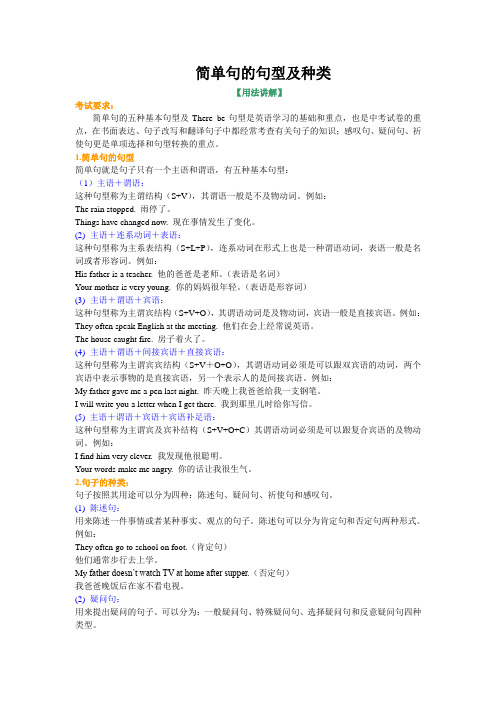
简单句的句型及种类【用法讲解】考试要求:简单句的五种基本句型及There be句型是英语学习的基础和重点,也是中考试卷的重点,在书面表达、句子改写和翻译句子中都经常考查有关句子的知识;感叹句、疑问句、祈使句更是单项选择和句型转换的重点。
1.简单句的句型简单句就是句子只有一个主语和谓语,有五种基本句型:(1)主语+谓语:这种句型称为主谓结构(S+V),其谓语一般是不及物动词。
例如:The rain stopped. 雨停了。
Things have changed now. 现在事情发生了变化。
(2)主语+连系动词+表语:这种句型称为主系表结构(S+L+P),连系动词在形式上也是一种谓语动词,表语一般是名词或者形容词。
例如:His father is a teacher. 他的爸爸是老师。
(表语是名词)Your mother is very young. 你的妈妈很年轻。
(表语是形容词)(3)主语+谓语+宾语:这种句型称为主谓宾结构(S+V+O),其谓语动词是及物动词,宾语一般是直接宾语。
例如:They often speak English at the meeting. 他们在会上经常说英语。
The house caught fire. 房子着火了。
(4)主语+谓语+间接宾语+直接宾语:这种句型称为主谓宾宾结构(S+V+O+O),其谓语动词必须是可以跟双宾语的动词,两个宾语中表示事物的是直接宾语,另一个表示人的是间接宾语。
例如:My father gave me a pen last night. 昨天晚上我爸爸给我一支钢笔。
I will write you a letter when I get there. 我到那里儿时给你写信。
(5) 主语+谓语+宾语+宾语补足语:这种句型称为主谓宾及宾补结构(S+V+O+C)其谓语动词必须是可以跟复合宾语的及物动词。
例如:I find him very clever. 我发现他很聪明。
中考英语解题训练-简单句的基本句型

英语
返回首页
3. 与 seem, appear, used to 等 表 示 状 态 的 词 语 连 用 , 构 成 “ There seem(s)/appear(s)/used to be…”。
4.“There be…”句式中的be有时用come, enter, follow, arrive, seem, happen等动 词代替,但不能用have代替。如:
英语
返回首页
5.主语+及物动词+宾语+宾语补足语(S+V+O+C)。 这种句型称为主谓宾补结构,其谓语动词必须是可以跟复合宾语的及物动词。如: I find him very clever. 我发现他很聪明。 Your words make me angry. 你的话让我很生气。 6.There be 句型。 英语“There+be+(not)”结构表示“有(没有)某人或某物”时,there 是无实际意 义的引导词,be是谓语动词,它后面的名词是主语,两者在数上必须一致。句末往往有表 示地点或时间的状语。 肯定句:There+(助动词或情态动词)+be 主语+地点(时间)状语。如: There is a pen on the table. 桌上有一支钢笔。
There happened to be nobody in the room. 碰巧那时房间里没有人。
英语
返回首页
◎考点2 动词be与主语的一致关系 动词be的形式要和最靠近它的主语在数上保持一致;另外,还必须注意不可数名词
用作主语时,动词be应用单数形式。如: There is an apple and two pears on the table. 桌上有一个苹果和两个梨。 There are two pears and an apple on the table. 桌上有两个梨和一个苹果。 含有引导词there 的句子用seem to be, happen to be, used to be 或live 等作谓语的结
中考英语语法语法专项之简单句

五、There be 句型(存现句)和主谓一致
3. There be 句型与have的区别
There be 句型表示“存在”,强调“某地或某时有某物或某人”,不表示所属关系。 have 表示所属关系,强调“某人或某物拥有...”。 There is a pen on my desk. 我的书桌上有一支钢笔。(钢笔在我书桌上,但不一定是我的) I have a pen. 我有一支钢笔。(钢笔不管在哪儿,它都是我的)
六、主谓一致
3. 就近一致
就近一致即谓语动词与离它最近的主语部分保持一致。 There be/Here be 句型 either...or..., neither...nor..., or not only... but also..., not... but...
一、简单句的基本句型
2. 简单句的五种基本句型:
主语+系动词+表语 (S+V+P) 主语+不及物动词 (S+V) 主语+及物动词+宾语 (S+V+O) 主语+及物动词+间接宾语+直接宾语 (S+V+IO+DO) 主语+及物动词+宾语+宾语补足语 (S+V+O+OC)
She is beautiful. Mike works hard. I teach English. Maria sent me a present.
二、疑问句
1. 疑问句的分类
句型 一般疑问句
特殊疑问句 选择疑问句 反意疑问句
结构 Be+主语+其他? 情态动词+主语+动词原形+其他? 助动词+主语+动词原形+其他? 助动词+主语+过去分词+其他? 特殊疑问句+一般疑问句? 一般疑问句,...+or+另一备选对象? 特殊疑问句,...+or+另一备选对象? 陈述句/祈使句+附加问句
中考英语语法之五种简单句全解析
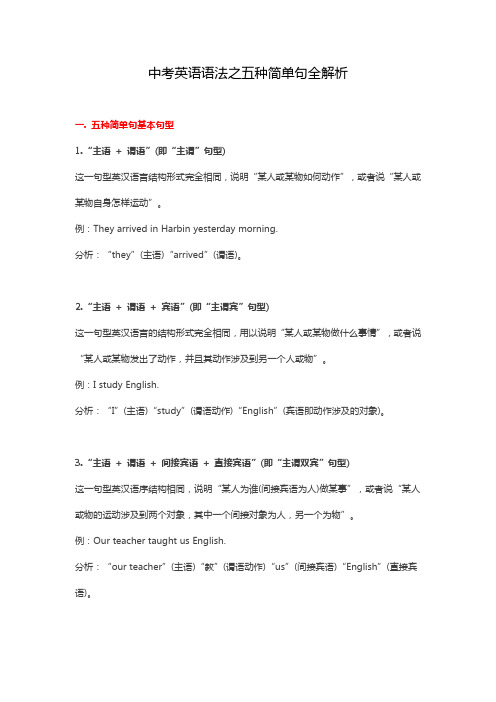
中考英语语法之五种简单句全解析一. 五种简单句基本句型1.“主语+ 谓语”(即“主谓”句型)这一句型英汉语言结构形式完全相同,说明“某人或某物如何动作”,或者说“某人或某物自身怎样运动”。
例:They arrived in Harbin yesterday morning.分析:“they”(主语)“arrived”(谓语)。
2.“主语+ 谓语+ 宾语”(即“主谓宾”句型)这一句型英汉语言的结构形式完全相同,用以说明“某人或某物做什么事情”,或者说“某人或某物发出了动作,并且其动作涉及到另一个人或物”。
例:I study English.分析:“I”(主语)“study”(谓语动作)“English”(宾语即动作涉及的对象)。
3.“主语+ 谓语+ 间接宾语+ 直接宾语”(即“主谓双宾”句型)这一句型英汉语序结构相同,说明“某人为谁(间接宾语为人)做某事”,或者说“某人或物的运动涉及到两个对象,其中一个间接对象为人,另一个为物”。
例:Our teacher taught us English.分析:“our teacher”(主语)“教”(谓语动作)“us”(间接宾语)“English”(直接宾语)。
4.“主语+ 谓语+ 宾语+ 宾语补足语”(即“主谓宾宾补”句型)这一句型说明“某人或某物要求(使、让)某人做什么”或“某人感觉某人或物怎么样”。
例:He asked her to go there.分析:“he”(主语)“asked”(谓语动作)“her”(宾语即动作涉及的对象)“to go there”(补语--补充说明宾语做什么)。
5.“主语+ 系动词+ 表语”(即“主系表”句型)这一句型用以说明“某人(某物、某事、某种概念)具有什么特征或处于什么状态”。
汉语的“是”字结构属于这一英语句型的形式之一。
常用的系动词有be, keep,lie, remain, stand, become, fall, get, go, grow, turn, look, feel, seem, smell, sound, taste, 等。
- 1、下载文档前请自行甄别文档内容的完整性,平台不提供额外的编辑、内容补充、找答案等附加服务。
- 2、"仅部分预览"的文档,不可在线预览部分如存在完整性等问题,可反馈申请退款(可完整预览的文档不适用该条件!)。
- 3、如文档侵犯您的权益,请联系客服反馈,我们会尽快为您处理(人工客服工作时间:9:00-18:30)。
中考英语专项解析和考点精练
简单句的五种基本类型
一、句子成分专业术语
主语S(subject)谓语V (verb)
表语P (predicative) 宾语O (object)
直接宾语DO (direct object) 间接宾语InO (indirect object)
宾语补足语C (complement);
谓语动词V(verb)主要有:
及物动词Vt(transitive verb)不及物动词Vi(intransitive verb)系动词LinkV(Link verb)
二、简单句的五种基本类型
(一) 主谓结构(S + Vi )
主语(S) + 谓动(Vi)
He died yesterday.
小练习:划出下列句中的主语和谓语。
1. I am jumping.
2. The boy has gone.
3. She will leave tomorrow.
4. My homework was finished.
(二) 主谓宾结构(S + Vt + O )
主语(S) + 谓动(Vt) + 宾语(O)
I am playing basketball.
小练习:划出下列句中的主语,谓语和宾语。
1. She will visit the Great Wall.
2. We have seen the film.
3. He cleans his bedroom on Saturday.
4. The old man was laughed at by these boys.
(三) 主系表结构(S + LinkV + P )
主语(S) + 谓动(linkV) + 表语(P)
I am tired.
小练习:划出下列句中的主语,谓语和表语。
1. She looks sad.
2. The soup smells delicious.
3. The coat feels soft.
(四) 主谓双宾结构( S + Vt + InO + Do )
主语(S) + 谓动(Vt) + 间接宾语(InO) + 直接宾语(Do)
He gave me a book.
小练习:划出下列句中的主语,谓语,直接宾语和间接宾语。
1. Mr. Wang bought me a new bike.
2. She passes her mother some salt.
(五) 主谓复宾结构( S + Vt + O + C )
主语(S) + 谓动(Vt) + 宾语(O) + 宾语补足语(C)
You can keep your book in your schoolbag.
小练习:划出下列句中的主语,谓语,宾语和宾语补足语,特别注意宾语补足语的词性。
1. We must keep our classroom clean.
2. The boss made the boy work all the time.
3. My mother told us to get up early.
4. I had my shoes mended.
5. I saw him enter the bank.
6. I heard the girl singing in the classroom.
简单句的五种基本类型考点精练
一、判断下列各句属于哪一种句式类型, 并划出句子成分。
1. Most Chinese speak Chinese.
2. You make your daughter wait so long.
3. Everyone laughed.
4. My sister is a doctor.
5. They are drinking tea.
6. The old man walks in the park.
7. She passed him the salt.
8. We keep the table clean.
9. They work hard.
10. The flower is dead.
11. Plants need water.
12. He gives me some seeds.
13. Many animals live in trees.
14. The spring is coming.
15. I have finished my homework.
二、选择最佳答案完成下列各题。
1. What is the sentence pattern of the sentence “Linda bought a book yesterday.”?
A. S + LinkV + P
B. S + Vt + InO + Do
C. S + Vt + O + C
D. S + Vt + O
2. Which is the sentence pattern of “He is making a cake.”?
A. S + Vt + O + C
B. S + Vi
C. S + LinkV + P
D. S + Vt + O
3.Which part is the VERB of the following sentence “Tom rides his bike to school every day”?
A. “Tom”
B. “rides”
C. “his bike”
D. “every day”
4. Which of the following is the structure of “ S + V + P ”?
A. My aunt is working in a middle school.
B. Both the pie and the sandwich taste delicious.
C. No one knows the answer to this math problem.
D. He enjoys reading and playing basketball very much.
5. Which part is the subject of the sentence “ What our teacher said means a lot ”?
A. What
B. What our teacher said
C. Means
D. Our teacher。
